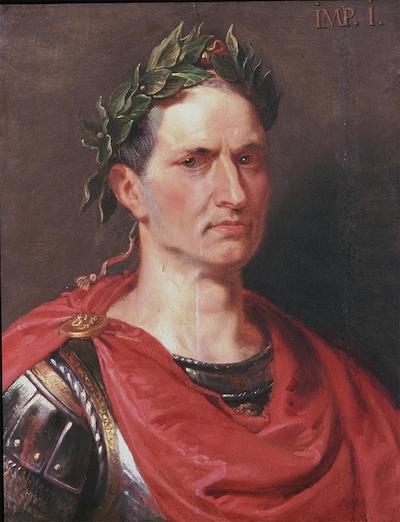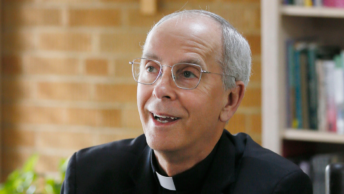Every three years we are presented with these verses (22:15-21) from the Gospel of Matthew, one that interests many of us because it deals with the question of separation between Church and State.
The first thing we should note is that the question put to Jesus was a lawyer’s trick question. It was not a question that sought enlightenment; it was not put to Jesus in order to learn from Him. No. It was put to Jesus to trap Him. Was He to be seen as an insurrectionist revolutionary and an enemy of the State or was He to be seen as a collaborator with the hated Roman authorities who so brutalized the Jewish people?
The Pharisees, the religious fundamentalists of the day, hated the Roman tax. The Herodians, those Jews who supported the Roman puppet King Herod, supported the tax. Both groups, the Pharisees and the Herodians, hated each other. But here we find them joined together in a combined effort to trap Jesus, to discredit Him, and thus do away with Him, each trying to trap Jesus for their own reasons.
With a canny response Jesus discredits them both. Both the Pharisees and the Herodians were Jews. Both groups, as Jews, rejected graven images as violations of the First Commandment. No Jew of any stripe would countenance the idea that idols were to be worshipped. Statues and images were totally forbidden as false, man-made gods.
Here we find Jesus in His response to their tricky question asking them for a coin, which they gave Him. Note that both they and Jesus were in the Temple area when this incident took place. Note, too, that the Roman coin had carved upon it the image of the infamous Tiberius Caesar, the one who had so desecrated the Jewish Temple. The coin also bore the inscription: “Tiberius Caesar – Son of the Divine Augustus”. On the coin’s other side it designated him as “Pontifex Maximus”, supreme priest. For Jews, this was blasphemous idolatry.
The fact that they had carried that coin with them into the Temple precincts tells us that they thereby discredited themselves. No good Jew would be caught with such a coin on the Temple’s grounds, the holiest site in all of Judaism.
Furthermore, we need to realize that Jesus’ response was directed at the precise issue of whether or not the Roman taxes should be paid. Jesus said nothing about the autonomy of Caesar in his secular role. Nor was Jesus making any statement at all about separating religion from society.
So these questions remain: What is Caesar’s, and what is God’s? Is there anything at all that is not God’s – is there anything at all in human activity that does not stand under God’s judgment? Are we, as modern day Americans, exempting anything from God’s purview?
Separation of church and state has benefited us here in the United States. We have a democracy, not a theocracy, and that has served us well. We do not have a state religion; we have freedom of religion. We are free to practice our religious beliefs as we choose.
But where is it written that freedom of religion means freedom from religion? Are people of faith obliged not to express their beliefs and put them into practice in the public domain? We must remember that while rendering to Caesar what is Caesar’s we must still render to God what is God’s.
Does God have expectations of us with regard to our civic order? Are our public policies to be exercised freed from God’s norms and apart from God’s will? What is to be kept from God’s purview?
Here are some examples of what concerns me.
One is found in the response our U.S. Congress made to the victims of Hurricanes Katrina and Rita. As bills for hurricane relief were being drafted in Congress, voices were raised objecting to giving any forms of relief to churches and other faith-based organizations. Such relief measures, intended for all citizens of these United States were, it was argued, to be denied to faith-based organizations. Why? Because giving them money, it was argued, would violate the principle of separation of church and state. In other words church members were not to be considered among the citizenry of our country entitled to disaster relief!
By now we are all familiar with the Obamacare’s mandate administered by the Department of Health and Human Services requiring religious organizations employing more than fifty persons to provide their employees with insurance coverage for abortion, sterilization, and contraceptive services. We know, too, that this requirement was applied to the Little Sisters of the Poor. The Department of Justice prosecuted them. Their defense was that they objected to this governmental mandate by citing the Constitutions’ First Amendment guarantee of Freedom of Religion. In response to the Little Sisters’ appeal, a Federal judge suggested that the Little Sisters simply sign a form declaring that they are an exempt religious organization. Why don’t they just sign this meaningless little form? By doing so the problem will go away the court said.
Well, these little nuns are smart enough to recognize that signing the government’s form is not meaningless. Why? Because the government retains its claim to interfere with their right to freely practice what they believe. The Sisters are astute enough to recognize that the government can take away what it so graciously granted. The government’s claim in effect defines how one’s belief is exercised. The “meaningless little form” isn’t simply a minor exception.
Freedom of religion isn’t confined to how one worships on Sunday. People of belief should be able to practice in public what they hold to in Sunday worship free of governmental controls and mandates.
Another example occurs to me. Article VI, Clause 3 of our Constitution prescribes that “no religious test shall ever be required as a Qualification to any Office or public Trust under the United States.”
What disturbs me is that in recent times people running for public office or appointed to hold public office, particularly the judiciary, are being subjected to religious tests. Precisely because they hold certain religious beliefs they are being subjected to political attacks. If they strongly hold to certain religious beliefs they are being told they are fundamentalist fanatics and therefore unqualified to hold public office. We need look no further than to recent debates over nominees for Justices on the U.S. Supreme Court.
Thomas Jefferson and many of our founding forbearers clearly held to the position that we must be a moral nation if our republic is to endure. The founders of our nation had strong religious beliefs and they founded our nation on firmly held positions that derived from their faith in the Almighty. Our Creator, they declared, endows unalienable human rights upon us.
Abraham Lincoln, in his monumental effort to preserve our union repeatedly appealed to the Almighty in his famous and powerful speeches. None of these men would subscribe to the notion that freedom of religion means freedom from religion in our civic life and in the fabric of our republic.
What, then, is Caesar’s and what is God’s? That question is being argued out in our times in a great debate over the importance and value of religion in our society. Reasonable people may differ in the application of answers to that question. But however much reasonable people may differ it is unreasonable to assert the notion that our American republic was built on the secularist mantra that freedom of religion in these United States means freedom from religion in our public affairs.
What is Caesar’s and what is God’s? The question is just as important to us now as it was when it was put to Jesus. And so is its answer. Your vote matters.








